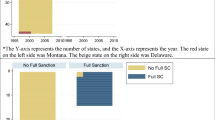Abstract
This study explores whether prolonged welfare experience reduces the job search commitment of the unemployed. More specifically, an attempt is made to determine whether participation in a government assistance program induces the unemployed to prolong their job search activities, either through reduced search effort or by asking a higher reservation (acceptance) wage. The data were obtained from a semistructured interview with 120 food stamp recipients participating in a pilot workfare project in Coahoma County, Mississippi. The interview questionnaire was designed to elicit the degree to which there was a relationship between welfare use and commitment to job search activities. The most important finding of the study was that in at least one economically depressed community, extended participation in a public assistance program did not appear to have a significant impact on the job search behavior of the unemployed. However, as important as this finding is, the small size of the sample and the uniqueness of the county (77 percent black) limit the applicability of the results to other rural communities across the nation. Therefore, there is a need to replicate and expand the study, utilizing a much larger sample representing a cross section of the counties in Mississippi and elsewhere in the United States.
Similar content being viewed by others

Notes
Lawrence M. Mead, “The Obligation to Work and the Availability of Jobs: A Dialogue Between Lawrence M. Mead and William Julius Wilson,Focus (Summer 1987).
Sheldon Danziger, Robert Haveman, and Robert Plotnick, “How Income Transfer Programs Affect Work Savings and the Income Distribution,Journal of Economic Literature, Vol. 19, No. 3 (September 1981): 975–1028.
Martin Anderson,Welfare (Hoover Institution Press, 1979); Charles Murray,Losing Ground (New York: Basic Books, 1984); Lawrence Mead,Beyond Entitlement: The Social Obligations of Citizenship (New York: The Free Press, 1986).
Arthur Mann and Robert Smith, “Public Transfers, Family Socioeconomic Traits, and the Job Search Behavior of the Unemployed: Evidence from Puerto Rico,”World Development, Vol. 15, No. 6 (1987): 831–840.
Kenneth Burdett, Nicholas M. Kiefer, Dale T. Mortensen, and George R. Neumann, “Earning, Unemployment, and the Allocation of Time Overtime,”Review of Economic Studies, No. 4 (October 1984): 559–578; Shelly Lundberg, “The Added Worker Effect,”Journal of Labor Economics, Vol. 3, No. 1 (January 1985): 11–37; David Blau and Philip Robins, “Labor Supply Response to Welfare Programs: A Dynamic Analysis,”Journal of Labor Economics, Vol. 4, No. 1 (1986): 82–104.
Paul Osterman,Getting Started: The Youth Labor Market Problem (Cambridge, Mass.: MIT Press, 1980); Stanley P. Stephenson, Jr., “The Economics of Youth Job Search Behavior,”Review of Economics and Statistics, Vol. 58 (February 1976): 104–11, Richard Freeman and Harry Holzer. “The Black Youth Employment Crisis: Summary Findings,” inThe Black Youth Employment Crisis, ed. Richard Freeman and Harry Holzer (Chicago: University of Chicago Press, 1986).
Jerome Culp and Bruce H. Dunson, “Brothers of a Different Color: A Preliminary Look at Employer Treatment of White and Black Youth,” inThe Black Youth Employment Crisis, ed. Richard Freeman and Harry Holzer, (Chicago: University of Chicago Press, 1986).
Michael A. Borus, “Willingness of Youth to Work,”Journal of Human Resources, Vol. 17, No. 4 (1982): 581–593.
Mann and Smith (1987); Blau and Robins (1986)
Steven Sandell, “Job Search Behavior by Unemployed Women: Determinants of the Asking Wage,”Industrial and Labor Relations Review, Vol. 33, No. 3 (1980): 368–70.
Leonard Goodwin,Do The Poor Want To Work? (New York: Vintage Books, 1972).
Donald Tomaskovic-Devey, “Labor Markets, Industrial Structure, and Poverty: A Theoretical Discussion and Empirical Example,”Rural Sociology, Vol. 52, No. 1 (1987): 56–74.
About this article
Cite this article
Fessehatzion, T., Fayissa, B. Public assistance and job search behavior of the rural poor-evidence from the mississippi delta. Rev Black Polit Econ 18, 79–91 (1990). https://doi.org/10.1007/BF02717876
Issue Date:
DOI: https://doi.org/10.1007/BF02717876



